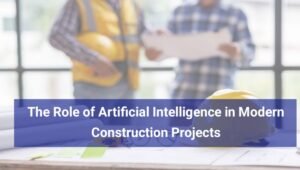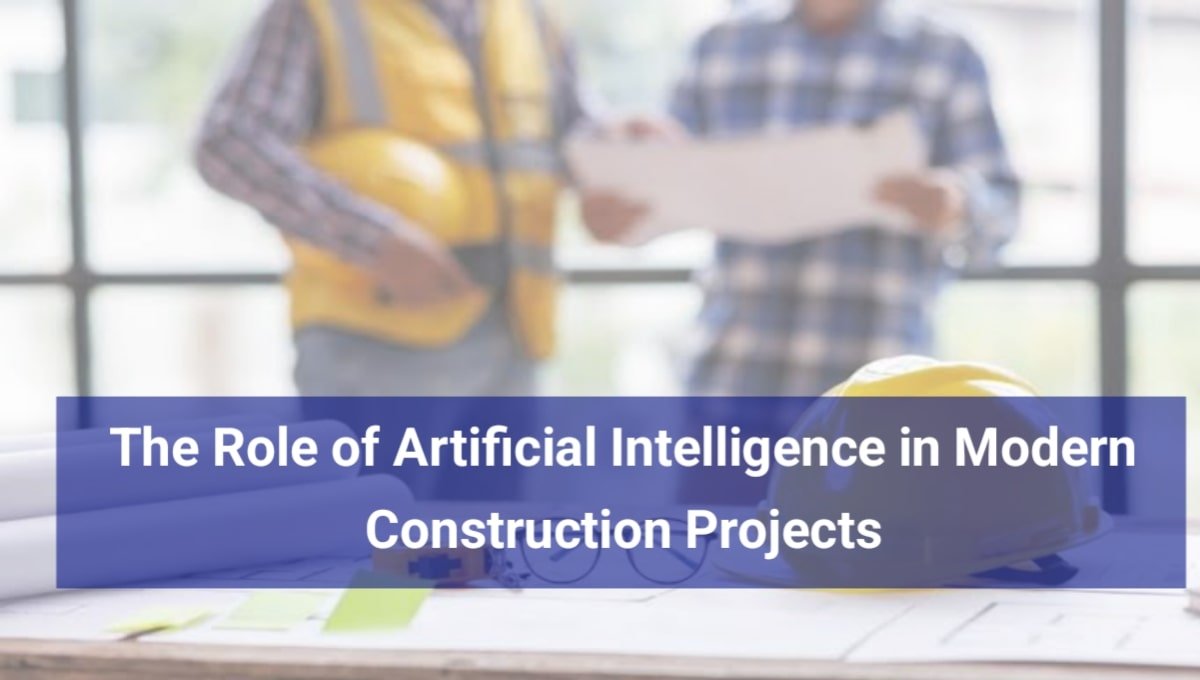The Role of Artificial Intelligence in Modern Construction Projects.
Artificial Intelligence (AI) is changing the way industries function, and the construction industry is one of the major sectors witnessing this transformation. From planning to execution, AI is bringing efficiency, accuracy, and safety to construction projects. Let’s explore how AI is playing an important role in modern construction projects.
The Role of Artificial Intelligence
1. AI in Project Planning and Design
Planning is the foundation of any construction project. Traditionally, planning was dependent on manual work, which was often time-consuming and prone to human error. With AI-powered tools, project planning has become more accurate and efficient.
When integrated with Building Information Modeling (BIM), AI helps architects and engineers detect potential design clashes before the construction phase begins. For example, AI can analyze 3D models and identify if two systems—like electrical wiring and plumbing—are interfering with each other. This reduces the chances of rework and delays, ensuring the project remains on schedule.
2. Risk Management and Prediction
Every construction project faces risks such as budget overruns, material shortages, or labor inefficiencies. AI makes risk management smarter by analyzing historical project data and identifying patterns. Based on this, AI tools can predict where issues might occur and allow managers to take preventive action.
For instance, if previous projects show delays due to specific suppliers, AI can suggest alternative vendors in advance. Similarly, AI can warn project managers about possible weather-related disruptions, helping them prepare contingency plans.
3. Site Monitoring and Safety
One of the biggest challenges in construction is maintaining safety at the site. With the use of AI-enabled cameras and drones, site monitoring has become easier and more effective. These systems continuously analyze live footage and can identify unsafe practices, such as workers not wearing helmets or working too close to heavy machinery.
AI also ensures progress tracking. Managers no longer need to rely only on manual updates; instead, they can use AI-generated reports to check if the work is going according to schedule. This reduces delays and improves transparency in large projects.
4. Predictive Maintenance of Equipment
Heavy construction machinery is essential for project execution, but unexpected breakdowns can cause costly delays. AI sensors attached to machines track their performance in real time and predict when maintenance will be required.
For example, if an excavator is showing signs of unusual vibration, AI can alert engineers before it completely fails. This approach not only saves repair costs but also ensures that projects are not interrupted due to equipment failure.
5. Cost Estimation and Budgeting
Budget overruns are common in construction, but AI helps reduce this problem. AI-powered cost estimation tools analyze labor costs, material availability, and project timelines to provide more accurate budgets.
By comparing multiple past projects, AI can also suggest how much buffer cost should be allocated. This allows construction companies to manage resources effectively and avoid sudden financial pressure during project execution.
6. Boosting Labor Productivity
AI is not replacing human labor but rather enhancing it. With AI-based task management tools, work is assigned in a more systematic way. Repetitive jobs such as scheduling, attendance tracking, and daily progress reports are now automated.
This means engineers and managers can focus more on decision-making instead of paperwork. As a result, productivity increases, and workers face less confusion regarding their roles.
7. AI in Sustainable Construction
Sustainability has become an important focus in modern construction. AI helps companies design energy-efficient buildings by simulating how structures will perform in different weather conditions. AI tools can suggest eco-friendly materials, optimize energy usage, and reduce waste on construction sites.
For instance, AI can calculate the exact amount of concrete or steel required, reducing excess use and minimizing environmental impact.
Conclusion
Artificial Intelligence is no longer just a futuristic concept; it is already transforming construction projects around the world. From planning and safety to budgeting and sustainability, AI provides smarter solutions at every stage of construction.
As India moves towards smart cities, metro rail expansions, and large-scale infrastructure projects, AI adoption will become even more critical. For engineers and construction professionals, understanding and using AI tools is no longer optional—it’s the key to staying competitive in the modern construction industry.
Role of Renewable Energy in India’s Smart Cities Development
Follow Our Channel: Click here
Home Page: Click here

